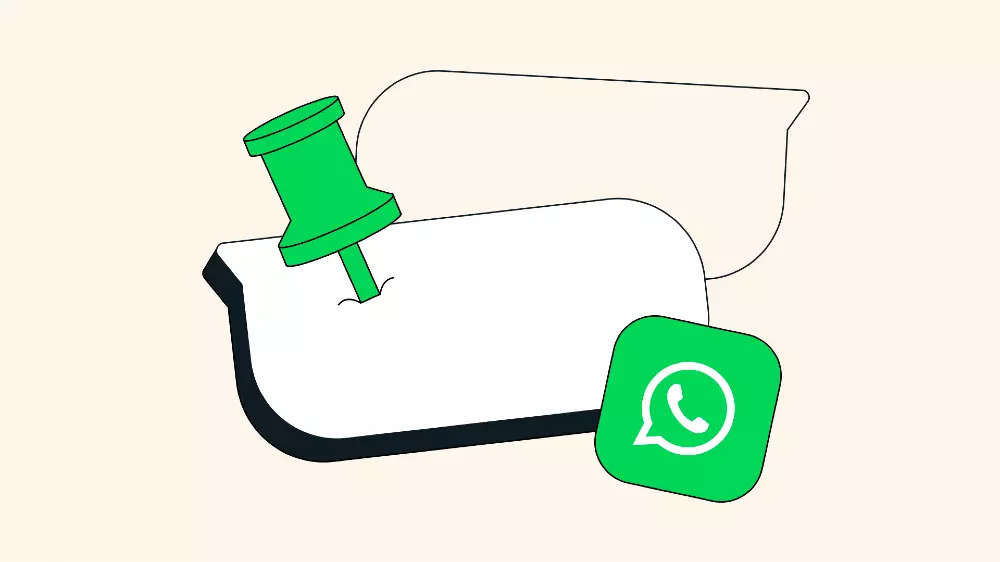WhatsApp rolling out ability to pin messages: Why is this feature important and how to use it – Times of India
Pinned messages allow users to highlight important information, saving time and energy as they no longer have to scroll through long conversations.Any type of message, including text, polls, images, and even emojis, can be pinned and remain accessible to all participants in the chat.
WhatsApp says that pinned messages are end-to-end encrypted, ensuring the same level of privacy as all WhatsApp communication.
With pinned messages, WhatsApp aims to improve user experience and streamline communication within its platform. This new feature is expected to be particularly useful for groups with many active participants, where important information can easily be buried beneath a flurry of messages.
How to pin a message
Users can pin one message to the top of a chat. The message will stay at the top of the chat as a banner for 24 hours, 7 days, or 30 days. Tap on the pinned message banner to navigate to the message in the chat.
On Android:
Tap and hold the message.
Tap more options > Pin > select the pin duration (24 hours, 7 days, or 30 days) > Pin.
On iPhone:
Tap and hold the message.
Tap More options > Pin > select the pin duration (24 hours, 7 days, or 30 days).
Web and Desktop:
Go to the message you want to pin and click menu > Pin message > select the pin duration (24 hours, 7 days, or 30 days) > Pin.
A pinned message is displayed as a banner at the top of the chat until it’s unpinned.
How to unpin a message
Android: Tap and hold the message > Unpin > Unpin.
iPhone: Tap and hold the message > More options > Unpin > Unpin.
Web and Desktop: Go to the message you want to unpin and click menu > Unpin > Unpin.
function loadSurvicateJs(allowedSurvicateSections = []){ const section = window.location.pathname.split('/')[1] const isHomePageAllowed = window.location.pathname === '/' && allowedSurvicateSections.includes('homepage')
if(allowedSurvicateSections.includes(section) || isHomePageAllowed){ (function(w) { var s = document.createElement('script'); s.src="https://survey.survicate.com/workspaces/0be6ae9845d14a7c8ff08a7a00bd9b21/web_surveys.js"; s.async = true; var e = document.getElementsByTagName('script')[0]; e.parentNode.insertBefore(s, e); })(window); }
}
window.TimesApps = window.TimesApps || {}; var TimesApps = window.TimesApps; TimesApps.toiPlusEvents = function(config) { var isConfigAvailable = "toiplus_site_settings" in f && "isFBCampaignActive" in f.toiplus_site_settings && "isGoogleCampaignActive" in f.toiplus_site_settings; var isPrimeUser = window.isPrime; if (isConfigAvailable && !isPrimeUser) { loadGtagEvents(f.toiplus_site_settings.isGoogleCampaignActive); loadFBEvents(f.toiplus_site_settings.isFBCampaignActive); loadSurvicateJs(f.toiplus_site_settings.allowedSurvicateSections); } else { var JarvisUrl="https://jarvis.indiatimes.com/v1/feeds/toi_plus/site_settings/643526e21443833f0c454615?db_env=published"; window.getFromClient(JarvisUrl, function(config){ if (config) { loadGtagEvents(config?.isGoogleCampaignActive); loadFBEvents(config?.isFBCampaignActive); loadSurvicateJs(config?.allowedSurvicateSections); } }) } }; })( window, document, 'script', );
For all the latest Technology News Click Here
For the latest news and updates, follow us on Google News.

